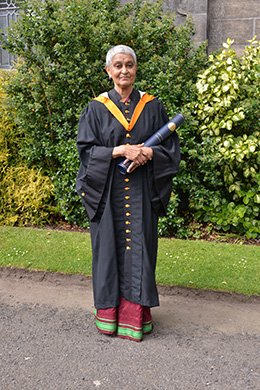Laureation address – Professor Gayatri Chakravorty Spivak
Professor Gayatri Chakravorty Spivak
Laureation Address
Laureator: Dr Gurchathen Sanghera
Thursday 26 June 2014
 Chancellor, it is my privilege to present Professor Gayatri Chakravorty Spivak for the degree of Doctor of Letters, honoris causa.
Chancellor, it is my privilege to present Professor Gayatri Chakravorty Spivak for the degree of Doctor of Letters, honoris causa.
There are many challenges in delivering a laureation speech for Professor Spivak, two of which are as follows.
Firstly, in three minutes, how do you sum up the career of an intellectual giant? Professor Spivak is someone whose CV spans over 50 pages; someone whose citations number over 21,000; someone whose intellectual influence spans the globe and has often translated into activism. The second challenge is getting across to our new graduates today the importance of Professor Spivak’s work and how it has influenced many academic fields including literature, history, politics, modern languages and feminism.
Born in Kolkata (Calcutta), Professor Spivak was educated in India and the United States. As one might expect, she was a brilliant student; she graduated with a First Class BA Honours degree in English from Presidency College, Kolkata, with gold medal awards in English and Bengali literature. At the age of 19, she went to Cornell University where she completed an MA in English and pursued a PhD in comparative literature. The topic of her dissertation was William Butler Yeats.
The academic importance of Professor Spivak’s impact is difficult to overstate. Hers is a truly remarkable career. Adjectives such as seminal, ground-breaking, canonical and transformative are regularly used to describe the impact of her work. Professor Spivak’s illustrious academic career has explored nineteenth- and twentieth-century literature; Marxism; feminism; deconstruction; post-structuralism; and globalization. She is best known for her contributions as a post-colonial critic. Whilst Professor Spivak has held a number of teaching posts and fellowships across the globe, in 2007 she was appointed University Professor at Columbia, making her the first woman of colour to be bestowed the University’s highest honour in its 264 year history. She is also a founding member of the Institute for Comparative Literature and Society at Columbia.
Professor Spivak first came to prominence in 1976 with her translation of Jacques Derrida’s Of Grammatology. Subsequently, she has published over 17 books and numerous peer-reviewed articles that have been translated into multiple languages. In 1985 she first published Can the Subaltern Speak? This truly ground-breaking piece, one of the founding texts of post-colonialism, perhaps best exemplifies the impact of her scholarship.
Whilst some of you may already be familiar with this work, for those of you who are not, this ever-evolving piece that needs to be read over and over again, reveals something new and different every time. It challenges the reader to let go of certainty and to embrace uncertainty. This piece highlights the importance of voice, silence and agency and it cautions us against the dangers of speaking for and speaking of. It demonstrates how the voices of subalterns or oppressed peoples across the world are written out of official narratives and systematically silenced through insidious structures and relations of power – both globally and locally. Crucially, Professor Spivak makes the point that the subaltern can indeed speak, but whether we are able to hear the subaltern voice is something else. With this contribution in mind, the key message for you graduates today is think about other people; acknowledge responsibility; that you can never take what you hear and see as a given, rather you need to ask whether what you are hearing and seeing is empowering or disempowering, for whom and why.
Professor Spivak is a recipient of numerous accolades, awards and fellowships. In 2012, she was awarded the prestigious Kyoto Prize in Arts and Philosophy, for speaking out against ‘intellectual colonialism’. The prize committee outlined that ‘she exemplifies what intellectuals today should be through her theoretical work for the humanities and her devotion to multifaceted education activities’. In 2013, she received the Padma Bhushan, the third highest civilian honour in India for her contribution to literature and education.
Professor Spivak’s impact extends far beyond the academy and into the world of practice and activism. Professor Judith Butler, also an honorary graduate of the University of St Andrews, has described how Professor Spivak’s work has had a profound influence on changing the thinking of ‘tens of thousands of activists and scholars’. Professor Spivak used her Kyoto Prize money to fund rural schools in her home state of West Bengal. Since 1986, Professor Spivak has been giving her time and skills to train teachers and students at six elementary schools in rural West Bengal, subsidizing them with her salary. In 1997, she established the Pares Chandra and Sivani Chakravorty Memorial Foundation for Rural Education with a bequest of her best friend, Lore Metzger, who died of breast cancer. For Professor Spivak, education has transformative possibilities, but in order to understand such potentialities she also questions what we mean by education. Humanities education for her is the development of the institutions of democracy at the very top, in the middle, as well as the very bottom.
How can I stress the importance of Professor Spivak, who provides us with remarkable insights into the workings of power, oppression, domination and contemporary forms of colonialism, and illustrates the ways in which we are often complicit in such processes, and who also warns of the importance of empowerment and challenging structures and relations of power through critical reflexivity and activism.
Chancellor, in recognition of her major contribution to the arts and humanities, I invite you to confer on Professor Gayatri Chakravorty Spivak the degree of Doctor of Letters, honoris causa.
Category Awards